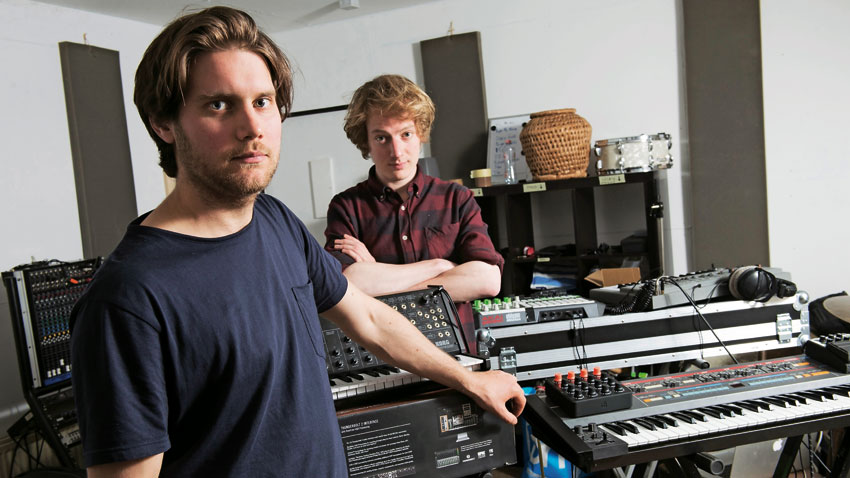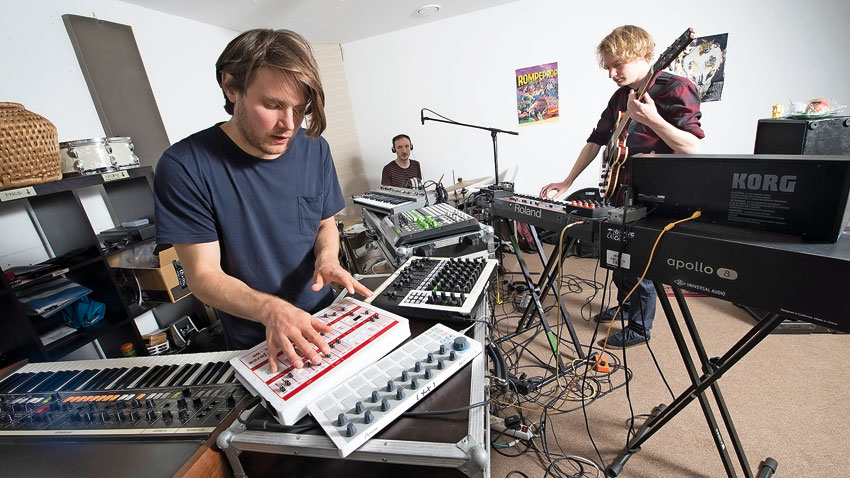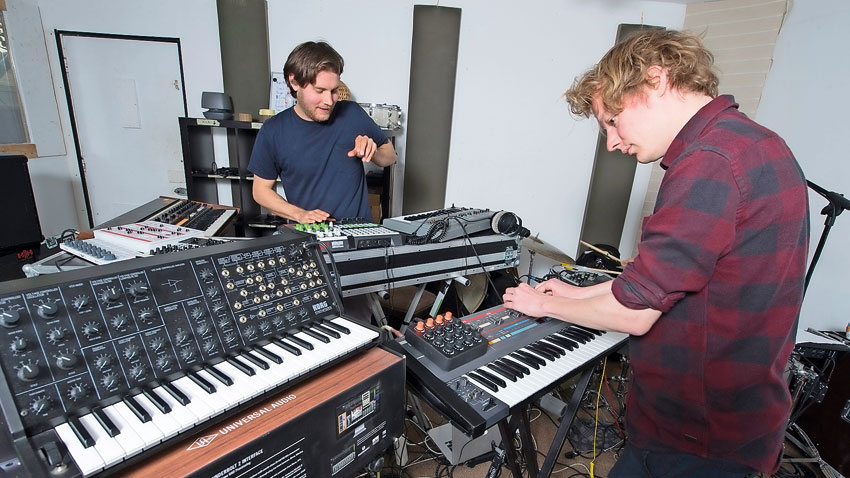Weval on producing their debut album and taking it to the live arena
We catch up with Weval as they prepare to unveil their new live show

Listening to the self-titled debut album from Weval, aka Merijn Scholte Albers and Harm Coolen, it's hard to believe that it's barely three years since the Amsterdam-based duo put out their first EP. Blending grandiose synth hooks with Krautrock-tinged drum lines, the album balances creativity and accessibility in a way that demonstrates a level of songwriting maturity belying the relative infancy of the outfit behind it.
Having met through a mutual connection to film making, the duo brought their disparate influences and music making backgrounds together to create their debut Half Age EP back in 2013. Its ear-catching combination of emotive synths and cinematic atmospherics caught the attention of German label Kompakt, who promptly signed the duo, releasing a pair of EPs and now their debut full-length.
With the album in the bag, Albers and Coolen are now turning their attention to expanding Weval's live show, moving beyond the standard Ableton/controller approach with the addition of a live drummer and a looser, semi-improvisational approach. We managed to grab a brief moment of downtime amidst preparations for the band's first live shows as a three-piece.
When and how did the pair of you first start making music together?
Harm: "About six years ago, through a mutual friend. We were both into film and the original idea was to get together and talk about a film project. We did that project, and it was really nice to know each other, but in the meantime, throughout those brainstorm sessions, we showed each other some music we were working on and had a feeling we could do more together creatively. We both had different taste and a different background in terms of what we were listening to when we were young, but it was nice to do. So we did it more and more."
Tell us more about your individual musical backgrounds…
Merijn: "Well my background was more like, listening to a lot of film soundtracks and trip-hop. There were a lot of rock bands. I didn't play a lot though, only a little bit of guitar and some piano. Then when I was around 17 I discovered the software program Reason and that was the first time I fooled around a little bit with making beats."
Get the MusicRadar Newsletter
Want all the hottest music and gear news, reviews, deals, features and more, direct to your inbox? Sign up here.
Harm: "When I was young I started more from a DJ perspective. So I started playing records and after a while I wanted to make mixes that were a bit more 'spacey'. From there, I thought I'd try making music from scratch around that particular kind of spacey stuff. At that time, all my friends who were DJing told me, 'Oh, producing is super difficult and all the programs are super difficult'. In the end, when I started, though, I found it wasn't so hard; of course, it's difficult to make a track you're really proud of, but it was like this big mountain to climb that looks tough but you just have to keep going with it. Even at the very early stages, too, it's really satisfying."
When you first started working as a duo, how easy was it for you to combine your two backgrounds?
Merijn: "For the first tracks we made, I'd already started producing some things in Reason, so I showed Harm these tracks and he came up with ideas for things I could change. So we started off, more or less, by just changing my old ideas. After we finished three or four of my old tracks, by that point we knew what kind of sounds each other liked - for instance, we both liked using samples of real drums combined with synth sounds - so we just started making more tracks with that sort of feeling. It's a bit of a melancholic sound, I guess."
Does your background in film still influence the music you make now? Do you still have a soundtrack-like element to your work?
Merijn: "I would still love to make a soundtrack for a real film, but when we make music we never think of things having to have a soundtrack feeling. I think it just sort of happens in the flow of how we work, but it's not something we do on purpose. We don't think in movie terms or whatever."
Where was the album created? Do you have your own studio space?
Harm: "A little more than a year ago, we got our first real studio, so that was the first time we weren't making music at home. It wasn't a real studio, though - it was just the attic of an old primary school building. It was only a temporary rental, so we had to get out of there, which was really a bitch as it was the perfect space. It was around 35 square meters, with windows but a little bit isolated. It had this really cool vibe. There was also a really big church square behind it, so we could play soccer there. That was our one rule: we had to play soccer every day once as a break, because we tend to work, work, work without a break. We found that to be a really good method."
What was the writing process like during those sessions? Did you each come in with separate ideas or was there a lot of jamming?
Harm: "A lot of time we have separate ideas; just small ideas, which can be quite abstract. Then, when we get in the studio, we take the project further and sometimes it leads to a whole different song. We do jam a lot, too, that's also a really nice thing to do. It's a little bit like two separate worlds, though - when you're jamming you don't have to worry about what you're doing, you just get on with playing music, but when you're creating a song you're focused on details and arrangements and you want to be in complete control."

Do the two of you have separate roles when working in the studio?
Merijn: "It's different each track. There are some tracks where, concept wise, it's 50/50, but sometimes it's 80 to 20. But in the end, every track we finish we've created together. The mixing we did together, but those first ideas, sometimes you can make the most of the blueprint at home or playing around on a plane or a train or whatever. It's different each track."
Harm: "I think with this album, we found a little that Merijn tends to be a bit more on the pop side, and he's a bit better with melodies and keys, while I brought a few more abstract sounds and drum ideas. It's an organic process, but we had some occasions where I'd come in with several minutes of soundscapes or drum tracks, and then Merijn would bring the chord progression."
What were the main synths that you used on the album?
Merijn: "When we first started on the idea of making a full length album, on the first day, we thought we needed a new sound, or some piece of new gear to give us some creative input. So we thought we'd buy some more analogue stuff. We searched on the internet and we found this Korg Trident - it just happened quite randomly one afternoon, and then the next day we were in this guy's attic playing on this synth. I still remember the first chords we played, we immediately fell in love with that synthesiser.
"So the Korg Trident is all over this record. We used the Korg MS-20 a lot too - it almost looks like we're sponsored by Korg. We had this thing that we combined that with, the Roland Space Echo. We ran the bass through that really loud so it distorts, then we'd put even more distortion on top to create the really rough bass sound that's on the record. We thought, 'Okay, these two are going to be the key sounds of the record'. It's both warm and edgy at the same time - that was more or less the feeling we wanted for this record."
What software do you use? Do you still use Reason as your main DAW?
Merijn: "We only use Reason for drums. We'll record drums and then chop up and resample them using Dr Rex in Reason. There's a really nice distortion in there, too, called Scream, and a tape emulator is great; I've never found a better software distortion than the ones in Reason. So we use that for almost every drum sound. Then we ReWire that into Logic, and we mix everything in Logic with all the effects
in there."
"I've never found a better software distortion than the ones in Reason. So we use that for almost every drum sound."
Harm: "Logic is where we have the main project."
Merijn: "All the drums come from Reason, though; we really like to chop things up in that program. It's just like Lego, it's really easy and playful and it works really well, so why change it?"
So are the drums mostly created by you guys chopping up your own recordings?
Merijn: "Yes. For example, on the track I Don't Need It, parts of the drums are sampled from our live drummer. His old band gave us a hard drive with every instrument line from their recordings, and the drums on that track come from one of those recordings. So we use samples, but they're taken from the drummer we work with. Then sometimes we'll take samples from really old stuff too."
Harm: "We'll combine that with just the drum computer in Reason, too. It's our way of rearranging the drum parts. Instead of asking a drummer to play differently, we'll chop it up and turn it into something we like."
Merijn: "We also do a lot of layering. We'll layer a lot of stuff together in order to try and make a new sound. Sometimes we take a stem from our drummer playing a kick, for example, but we might pitch that up to make a snare. That's what I really like about making those kinds of drums: you can keep the acoustic sound, but chop it up like it's an electronic beat. When I listen to music, that's something I really like, and it's also really fun to do."
When it came to mixing the album, did you do that yourselves?
Merijn: "We did everything ourselves, mainly in the same studio, but at the end we decided we needed a bass check. That's always the hard part, so we spent three days in a really big studio just to mix the low-end. Then we locked the tracks and we ran about 80% of them through tape. Some tracks didn't fit the sound of tape, but we tried it with every song. We were really happy with that sound, because it turns a track into a little package, and it can make the whole thing sound a little edgy, although not harsh - it's hard to describe exactly what it does, but we did a lot of blind tests and most of the time the tape version sounded better than the original. So it definitely helps!"

Since finishing the album, you've been preparing your live show… Can you tell us a bit about how that's going to work?
Merijn: "Last year we mainly travelled with controllers. We occasionally played shows with the 106 and the MS-20, but it's hard to travel with a Juno, so we were mostly doing things in-the-box. Also we were mainly focused on writing the album, so it wasn't until last month that we were able to focus on the live set again. We came up with this idea to work with a drummer. So we're going to end up having two setups: one with a drummer and synthesisers, and one with just the synths."
Harm: "When we rehearsed yesterday with our drummer, we came to the conclusion that we'll need to end up improvising quite a lot. For one thing, that makes it exciting for us, but also for the audience. When I go to a concert myself and I see a band play a song that sounds like the record, it's really good if they can make that sound live, but it can feel like they're getting a little bored with it and it's not fun to watch. I always want to be surprised a little. So we try to mix up the tracks; we remix them a bit or just take sections of the songs and improvise over that to make it a big, trippy experience.
"The drummer is free to improvise as well. Sometimes you have parts in the track which are locked down - so there are parts that need to be really tight and parts where we can just let it flow. It's a really fun way to play, but really hard as well. There are times you'll play a song through and you think you have it, then the next time you'll lose it or you don't lock into each other, but I think it's really fun that you're vulnerable on stage.
"It's not like an Ableton set, where you've just got a track and you play it, and everybody's dancing but you don't really do a lot. We don't enjoy that at all. The big challenge with improvisation is to find momentum. For example, if I have a bass in my hands with MIDI running through it, and I can play with the cutoff and decay… I can make it louder, which is cool, but what's really cool is if I can make it build along with the drummer or along with what Merijn is playing on keys. So even when you have no structure, you have to find the concentration of things that all happen at the same time. When we were playing yesterday, we did two takes: one where it just happened and it was so cool, it just clicked… and another where we were searching and didn't find that one moment. I think that's the biggest challenge for us to work on: making sure that we're there with the audience and we can have this moment."
So your upcoming shows will be the first time you've ever played with the drummer in front of an audience?
Merijn: "Yeah, we still play sometimes with just the two of us, but it's just a bit more club sounding. But this month [June] we're going to play more or less the whole record for the first time with the drummer. Actually, a few weeks ago, we already played three tracks [as a three piece] on BBC Radio 1. That was the first time we did it - it was a really big risk but we just wanted to have a new challenge. We thought we could do it the old way with controllers and synthesisers, but we already had footage of us playing like that, so we thought we'd take the risk and do three tracks with the drummer. I hope it went well; I still haven't seen the recording from that day, but it felt good! I'm looking forward to playing more and more with the drummer and letting the whole thing evolve."
Harm: "The other big challenge is how it's going to sound, because normally we can process everything; but now you have the room and all sorts of circumstances to deal with. It's a really interesting situation for us. You have microphones and drums to think about; what kind of snare do we want to use, what kind of processing are we going to do? We've got these things to think about; it's a really interesting new way of making music for us."
Weval is out now via Kompakt. For info, news and live dates check their Facebook page.


Future Music is the number one magazine for today's producers. Packed with technique and technology we'll help you make great new music. All-access artist interviews, in-depth gear reviews, essential production tutorials and much more. Every marvellous monthly edition features reliable reviews of the latest and greatest hardware and software technology and techniques, unparalleled advice, in-depth interviews, sensational free samples and so much more to improve the experience and outcome of your music-making.
"Reggae is more freeform than the blues. But more important, reggae is for everyone": Bob Marley and the Wailers' Catch a Fire, track-by-track
“Part of a beautiful American tradition”: A music theory expert explains the country roots of Beyoncé’s Texas Hold ‘Em, and why it also owes a debt to the blues










